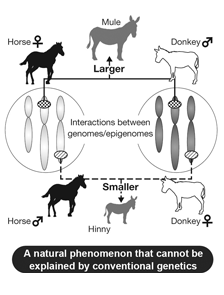文部科学省科学研究費補助金「新学術領域研究」
新学術領域|ゲノム・遺伝子相関
【Purpose of the Research Project】
To date, biology has been developed by studying model organisms, which have homogenous genome. Whereas, natural organisms have a highly polymorphic genome and epigenome, in which the complex "correlative gene inter- action" determines the actual phenotypes. Conventional genetics cannot always explain such complex natural phenomena. For example, the mule, which is produced by crossing of a female horse and male don- key, is large and suitable for livestock; in contrast, the hinny, which is produced by crossing of a female donkey and male horse, is small and not suitable for livestock. These mechanisms are largely unknown,  and such complex genetic phenomena may result from correlative gene interaction between female and male with different genome and/or epigenome. Here, we refer to these as-yet-unknown biological inter- actions as a "correlative gene system."
and such complex genetic phenomena may result from correlative gene interaction between female and male with different genome and/or epigenome. Here, we refer to these as-yet-unknown biological inter- actions as a "correlative gene system."
In this project, we will uncover molecular mechanisms and the common principle of the "correlative gene system," which drives the diversity and complexity of biological events. Furthermore, by studying the evolutionary process that produces highly polymorphic natural organisms, we will establish a field of next-generation genetics with the concept of "correlative gene system".
【Content of the Research Project】
This research project is primarily intended to dissect common molecular mechanisms of the "correlative gene system" between intra- and inter-individual genomes. Especially, it becomes obvious as the harmonic interaction or conflict between the male and female genomes when they meet each other during reproduction. Therefore, our project includes research themes related to sexual reproduction such as gamete selection, imprinting, hybrid vigor/weakness and speciation. We are also interested in the compatibility or incompatibility of interactions between different species, such as host-parasite inter- action and symbiosis.
The unraveling of each "correlative gene sys- tem"-related phenomenon will lead to overall understanding of the common mechanisms. Gene duplication and epigenetic regulation are possibly involved in the "correlative gene sys- tem," as basic molecular mechanisms. More- over, we will establish a new research field of genetics by examining the evolutionary history of this system.
【Expected Research Achievements and Scientific Significance】
Because the relationship between gene(s) and phenotype(s) is not linear, we still do not have an entire biological view of the complex living organism, although the genomes of many plants and animals have been sequenced. It is also difficult to understand lifestyle diseases and agricultural traits, which are controlled by several loci. This might be partly due to the lack of our understanding of the "correlative gene system." When we systematically eluci- date what the "correlative gene system" is, our results are expected to contribute to not only fundamental biology but also to applied areas such as breeding and ecosystem integrity.
【Key Words】
Correlative gene system: A concept of genetic systems producing the phenotypic diversity of living organisms via interaction among various alleles, genes and epigenetic mechanisms.
Epigenome: Overall epigenetic status of a genome, which is determined by DNA and/or histone modification.
【Term of Project】
FY2011-2015
【Budget Allocation】
1,217,000 Thousand Yen








